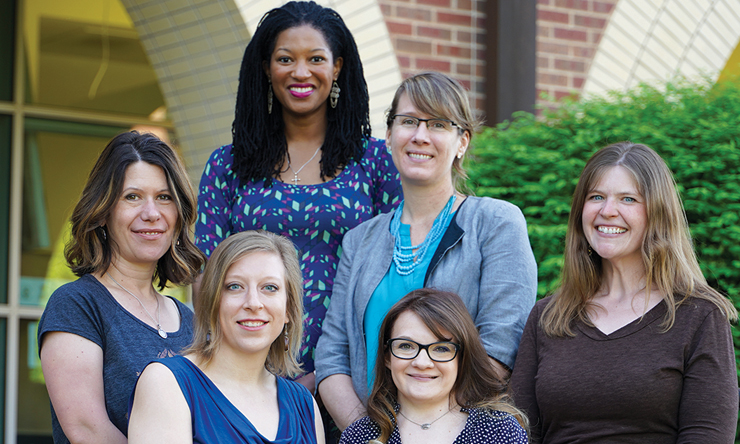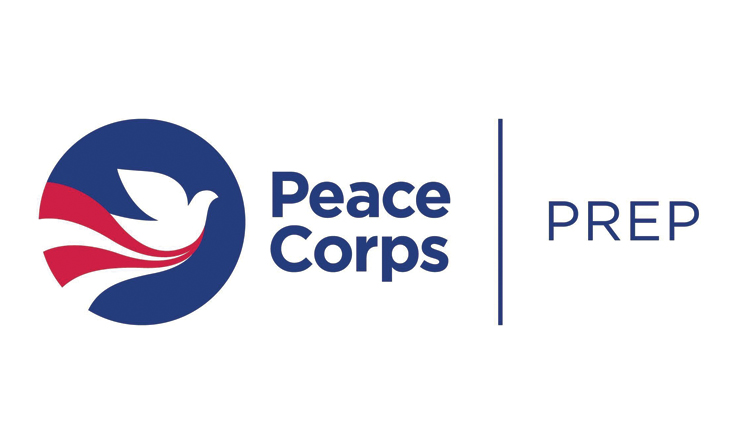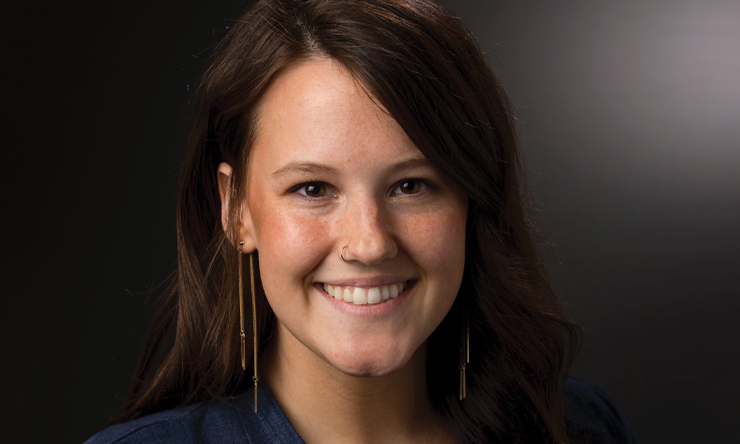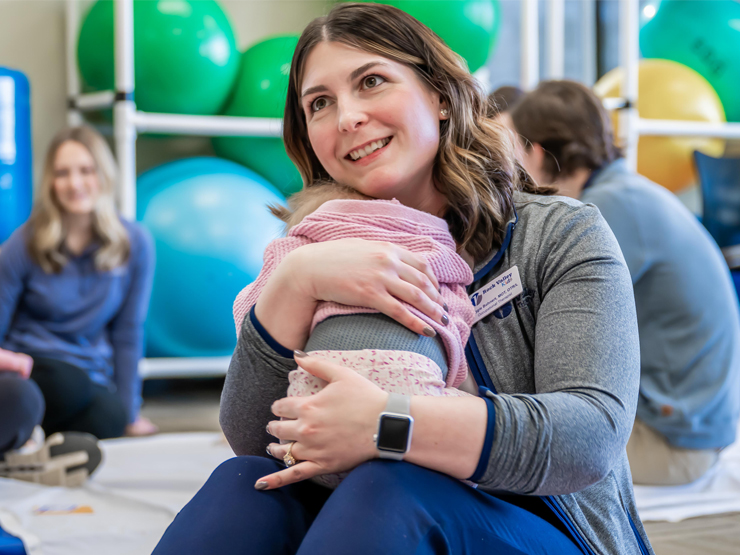Esprit de Corps
By Dawn Neuses '94
Meet the panelists:
Kaitlin Bormann, '16 MOL, director, service and justice ministry, Campus Ministry
Served: live-in staff member at Holy Family Catholic Worker House, a soup kitchen and house of hospitality in Kansas City, Missouri, and youth minister from 2009-10; then one year in the Campus Ministry & Social Action office at Manhattan College in the Bronx, New York, creating service opportunities for students. All service was for AmeriCorps through the Lasallian Volunteer Program.
Why volunteer? "I wanted to put my faith into action after graduating and make a difference while living in an intentional community with other volunteers."
Jenny Ferrell, '18 MOL, administrative assistant, Enrollment Management
Served: water sanitation and health educator in Ghana, West Africa, from 1999-2001 for the Peace Corps. Helped the village's water sanitation committee care for the existing well and raise funds for a new one; went house-to-house to explain good health practices; organized an HIV/AIDS awareness club for teens; helped children build English language skills. Also volunteered for AmeriCorps from 2004-05, as program coordinator for the Queens, New York, branch of Dress for Success.
Why volunteer? "I wanted to travel and experience a different part of the world. Volunteering for the Peace Corps ended up changing my life for so many reasons. If there is a cellular level you can be changed at, this did it for me."
Stephanie Gronowski, '14 MOL, internship coordinator and career advisor, Career Center
Served: elementary reading tutor for City Pride Leaps in Literacy, Brockton, Massachusetts, from 2002-03 for AmeriCorps; followed by one year of AmeriCorps VISTA service with Capital City Education Initiative, St. Paul, Minnesota, from 2004-05, where she recruited, trained and placed volunteer reading and math tutors in an elementary school.
Why volunteer? "I had no plan when I graduated, but knew I wanted to do something I believed in. I considered Peace Corps but was a little intimidated by the two-year commitment. When a friend mentioned AmeriCorps, I realized it was the best of both worlds. I could do service, but for a shorter time."
Katelyn Horberg, program assistant, Master of Public Health
Served: community health volunteer in Cameroon, Africa, from 2011-13, for the Peace Corps, focusing on maternal/child health and HIV, as well as working with school children and adults on issues such as malnutrition, malaria, water sanitation, reproductive health and domestic violence.
Why volunteer? "After getting my bachelor's in anthropology, I knew I wanted to travel and experience foreign culture, as well as do something productive that would make a positive impact. The Peace Corps helped me achieve all of these goals."
Argrow Kitnequa ("Kit") Evans-Ford, DMin, adjunct professor of Theology
Served: sixth-grade special education teacher in Washington D.C., with Teach for America through AmeriCorps. Also served as a community development worker on the island nations of
St. Christopher and Nevis, 2007-2008, for the Peace Corps, focusing on HIV/AIDS education, special education, literacy programs, women in politics and domestic violence.
Why volunteer? "I wanted to serve my country, but also to serve people in a context that was different from my own. I was stretched, but in the process a whole new world opened to me. I am forever grateful for my Peace Corps experience."
Melissa Sharer, PhD, program director and assistant professor, Master of Public Health
Served: educator in Armenia, 1994-96, for the Peace Corps, teaching English as a foreign language, micro-enterprise to women who owned or wanted to start a small business and provided public health teacher training for elementary educators.
Why volunteer? "It was always part of my path, and I felt very privileged to do it outside of the USA. I learned more than I could ever hope to contribute."
Six St. Ambrose faculty and staff recently sat down and discussed their experiences in the Peace Corps and AmeriCorps.
Volunteering in the US and abroad, these Ambrosians taught women, men, children and the elderly skills to be healthy and sustained, to survive and flourish, to lead and be safe. They rallied volunteers and sparked grass-roots change that improved schools and communities, then and now.
Their service was a path to self-discovery: lessons about inner strength, determination and resourcefulness. These "retired" volunteers gained a life-changing perspective that informs every aspect of their work and lives.
In that manner, these Ambrosians continue to serve.
What did your service teach you about the world?
Katelyn Horberg: "I had led a fairly sheltered life and was exposed to things I was never exposed to before: poverty, culture, a different continent."
Stephanie Gronowski: "AmeriCorps believes that you can't truly understand poverty without living in poverty. They set you up so you don't make a lot of money, and I had to go on food stamps because I couldn't afford food and heat in my apartment. Those are experiences I wouldn't have had otherwise, and I gained many life lessons for the future, such as budgeting, sacrifice, being aware of different people and the circumstances in which they live."
Kit Evans-Ford: "Teach for America taught me teaching is about the content, but it is also about compassion and love for students. It taught me education is extremely important and everyone should have access to it, regardless if you are living in an impoverished community or very wealthy community. It also taught me that underneath the surface our children are dealing with a lot of difficult issues: poverty, violence, and sexual violence. It made me sensitive to the reality of social injustice within our society, but also within families. It caused me to want to do more."
How did your service change you?
Kit Evans-Ford: "My Peace Corps experience taught me that I am not the expert, the community is always the expert. I was a community development worker, and it was not so much about my education as it was about developing relationships. I learned to sit down with people, to really listen and understand what it is they need. And, because I had the privilege of being a Peace Corps volunteer, I could connect them with resources."
Melissa Sharer: "I remember, after I came back, almost losing it at a restaurant because there were too many choices. It was too much. Like how I craved peanut butter, and then to go to the grocery store and see 20 kinds of peanut butter and being unable to choose. I recognized the excess and questioned the need: what's the purpose of all of this? Those things were heightened after my service."
How did your service change your view of your skills or how you professionally approach situations?
Melissa Sharer: "I became less sure of my skills. I always say the community teaches you so much, you just have to listen. And many times in my life I've gone into a situation with my skills and got smacked down because the community knows so much more than me -always. I think my experience was very humbling, in a very good way."
Katelyn Horberg: "I felt more confident in my ability to make a situation work, to be more resourceful."
Kit Evans-Ford: "Part of the learning experience within any service program you do is accepting the joy and the moments of discomfort. My husband says there are times in relationships when, instead of running away from each other, you need to run to each other. I found that helpful when I got uncomfortable. The people in your community become your family away from home, and you learn to lean more into the relationships you are establishing."
How does your service experience reflect in your work at St. Ambrose?
Kaitlin Bormann: "It is what I still do: try to connect students with service opportunities even if it is just a couple blocks away, and letting them know it can be a transformative experience if they let themselves be open to it."
The Peace Corps teaches you to be in solidarity with people; how to journey with them. We are actually present, living in the community, and walking hand-in-hand with the people we serve, to see how we can empower them on their journey. We are allies, serving, in solidarity, and it is powerful, and so important. I would recommend it to anyone.
Argrow Kitnequa ("Kit") Evans-Ford
Stephanie Gronowski: "I try and build awareness of Peace Corps and AmeriCorps service, especially for students who are struggling with their next step, like I was when I graduated. These experiences build great skills and I want students to know it is an option."
Jenny Ferrell: "For me, it's about reflecting on other people and considering different perspectives within my work, to always ask ‘How is someone else thinking about this?'"
Kit Evans-Ford: "I learned how to be present with people. I gained a wealth of experience connected to culture, peace and development. It is a good lens in which to see the world, regardless of what you choose to do as a career. It is foundational to who I am, and it made me a really good teacher and professor."
Melissa Sharer: "It is part of my DNA. There is no way to separate that experience and what I've done in the 20 years after Peace Corps. It is part and parcel of service, figuring out how to use your skills to help humanity as best you can, to contribute."
What characteristics does a person need to serve in the Peace Corps or AmeriCorps?
Melissa Sharer: "Respect for, and acceptance of others and other ways of looking at things; the ability to understand what is a norm; and being super flexible and proactive. Knowing yourself really well before you go is critical because you are going to learn a lot more about yourself after your service. And, an understanding that you are going to get a lot more than you'll ever give, ever. It's a luxury, a privilege, to be able to serve."
Jenny Ferrell: "A sense of adventure, a desire to experience different cultures, and of course, to help someone. But whether you have it all together or not, these programs are ideal for anyone who has the willingness to serve and open-mindedness. I joined because I wanted to travel, and I was so unsure of my skills. I was very scared about finding a real job. I didn't have all of my T's crossed and I's dotted, but I got in, and it was fabulous."
Stephanie Gronowski: "I agree with Jenny. I grew up in the Quad Cities, went to school in Iowa City, and I wanted to try something new. I picked a program on the East Coast because I wanted to live there, and it was an adventure-a safe adventure. For my second round, I was trying to find a job in the Twin Cities and I didn't, so I signed up for another year of service because it was the type of job I was drawn to; it was what I was passionate about in life."
Certificate Program Will Ready SAU Students for Peace Corps
This fall, St. Ambrose becomes the second university in Iowa to offer Peace Corps Prep, a program that recognizes students as active and informed global citizens who have intentionally prepared for service abroad.
"Through this partnership with the Peace Corps, our students will be ready to go forward and live in a manner that shows their dedication to service for others and for the world," said Professor Duk Kim, PhD, director of International Studies and coordinator of the Peace Corps Prep program at St. Ambrose.
"Our students will be prepared for international development fieldwork and potential Peace Corps service," he added.
To complete the program, students will take courses that build intercultural competency and foreign language skills, as well as professional and leadership abilities. The courses must fit within six sectors the Peace Corps has identified as priorities: education, health, environment, agriculture, youth in development and community and economic development.
Successful students will receive a certificate from the Peace Corps that formally recognizes their readiness to serve abroad.
"Service is a core value at St. Ambrose University and students are presented with many opportunities to grow and develop a life that focuses on service through various activities as part of their education," Kim said. "Participation in Peace Corps Prep is a natural fit for many students and dovetails extremely well with SAU's focus on service learning and social justice."
Share This Story





